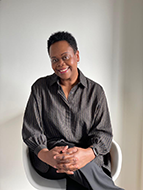Diversity
Travel is all about meeting new people and learning about other countries, cultures and communities – so you might assume the industry behind it must also be one of the most diverse, with a workforce that is as varied as the experiences it offers around the world.
Travel is still a work in progress, with strides being made towards more equitable employment opportunities.Companies are improving recruitment strategies to make them more accessible and are increasing support for talented employees already in the business. But the industry still faces challenges to improve its racial diversity and ensure all employees see clear paths to senior roles, regardless of their abilities, gender or sexuality.
While a few companies make their data available publicly – such as adventure operator Intrepid Travel, which employs more than 2,400 staff worldwide from 70 different nationalities – one of the challenges is a lack of data to measure progress.
Thea Bardot, who spent six years working in luxury travel events, says: “The problems were so blindingly obvious. I knew there was an opportunity to provide representation and create real change, so I set up Lightning Travel Recruitment. My gender journey has been directly linked to the business, with me now being a proud trans non-binary award-winning business leader.
“Companies need to show that they take these things seriously, how they safeguard their diverse employees through support available, backed up by HR policies. I can’t say it enough: representation matters.”
But there are steps in the right direction, like the recent national advertising campaign by Virgin Atlantic celebrating individuality, and tour company Contiki being recognised for its DEI (diversity, equity and inclusion) efforts, which include launching Pride trips for LGBTQ+ travellers and conducting DEI training for all staff.
"We’ve been hugely impressed by the work at the University of Northampton, which has developed the first DEI module of its kind as part of its travel and tourism degree,” adds Bardot.
“Lightning is visiting the students to share our stories and give advice – we can’t wait to get stuck in and implore the industry to engage with academia to nurture future talent.”
 Credit: designium, Vitalii Vodolazskyi, Saferizen/shutterstock
Credit: designium, Vitalii Vodolazskyi, Saferizen/shutterstock


is a male allyship network coordinator at Women in Travel
“I’m 24 and from Lithuania, and travel is a real passion for me. I did a degree in international tourism and hospitality management at Bournemouth University, including exchange programmes at universities in Macao and Italy to learn the business side of tourism. I was in my final year, writing my dissertation, and wanted to learn more about solo female travellers so I emailed Alessandra Alonso, the founder of Women in Travel. She has been a real ally to me, so I came to work with her. Women in Travel is a social enterprise that focuses on the empowerment of women and of male allies to support women in the travel industry. We organise online and in-person events so my day-to-day job involves meeting new people, telling them about the programme, matching mentors and mentees and spreading the word online. There is positive change happening in the industry, but there are still challenges. If you are looking at how to enter the industry, reflect on your interests and strengths. You don’t have to go down the conventional path of a graduate scheme. We’re active in our allyship and mentoring programme and we’re building a whole community.”

is a lecturer in business and tourism management
“I travelled to the Caribbean at 18 – my first time leaving the UK – and enjoyed it so much I decided I wanted to work in travel. I got a job at a short-haul tour operator, then moved to Jamaica and spent 20 years in the Caribbean, where I was fortunate to find a mentor in Jamaica’s first female director of tourism, Carrole Guntley. For any young person wanting to enter the travel and tourism industry, particularly if they are from a diverse background, I would strongly advise them to get a mentor. It’s a great opportunity to discuss your ambitions and get help to go in the right direction. I returned to the UK to be director of marketing for Antigua & Barbuda Tourism and then for the Caribbean Tourism Organisation, working with more than 30 countries to learn about their culture and heritage so marketing campaigns recognised the individuality of each destination. Now I’m a lecturer and trainer with the United Nations World Tourism Organization. Travel is a fantastic industry, but there is a lack of racial diversity. The way forward is to stop talking and start working with colleges and universities to develop mentorships and apprenticeships.”
